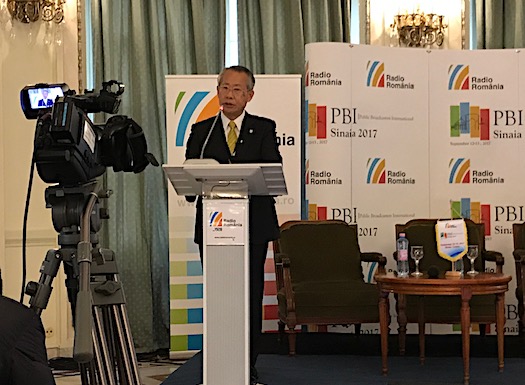Japan’s national broadcaster is currently preparing its next strategic plan. As part of the forward looking planning process, NHK is facing “fundamental questions” about the role of a public broadcaster in the modern era of broadcasting.
Speaking at the Public Broadcasters International Conference earlier this month, recently appointed NHK President Ryoichi Ueda (pictured) told conference delegates:
“We are prepareing our strategic plan. The fundamental question is, what values should we deliver in this period?
“TV is declining and use of the internet is growing.
“It is a key quesiton for broadcasters – how can we use the interet to deliver content now? Like us, many Public Service Broadcasters used the internet from very early, but we all need to keep evolving.
“Japan’s laws limit the ability to simultaneously broadcast our content on the airwaves and the internet. We are addressing this to change it in the face of modern audience usage habits.
“Changing technology now allows people to have vast amounts of data, but it also has a dark side. It allows broader consumption of false information. Against this backdrop the role of Public Service Broadcasting is becoming more significant.
“It is up to us to shine a bright light on false news and provide information that people can trust. NHK has a duty to play in this task.”
NHK will also look for ways to bolster its financial base. NHK gains 97% of its income from licence ‘receving fees.’ Even thought here are no penatlties for non payment more than 80% of the population pays them. Ueda says this is “a sign of the high level of trust in us.”
Ryoichi Ueda took up his post as president in January this year. The 67 year old was previously a member of the NHK Audit Committee as well as Board of Governors, after he resigned from a long and distinguished career at Mitsubishi Corporation.
He believes there are six core values for NHK to focus on in the next few years:
1. Providing accurate fair impartial information, without misrepresentation.
2. Promoting safety and security in our communities.
3, Creating high quality cultural experiences.
4. Contributing to education and welfare. As young people turn away from television, generating material that appeals to them is key. NHK is making new content and interactive programs for young audiences to actively participate in the national broadcaster’s content.
5. Contributing to the development of local communities.
6. Connecting Japan to the world. Reaching audiences outside Japan.
Another important priority for NHK will be to “provide the highest standards of services toward the upcoming Olympics in Japan.”

